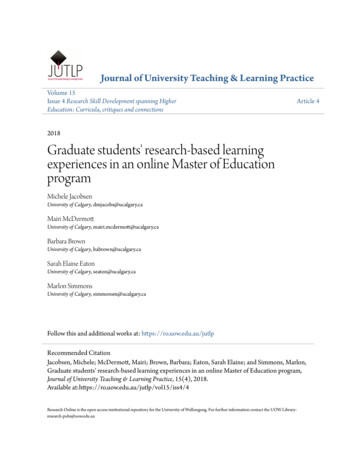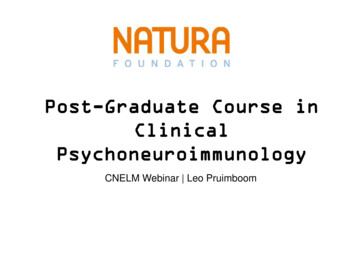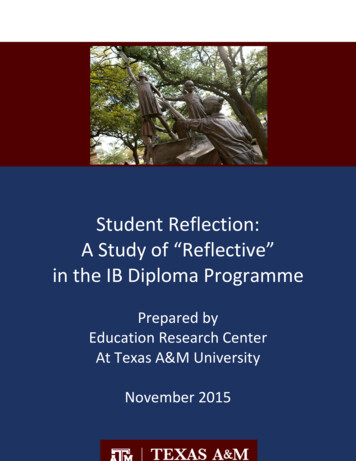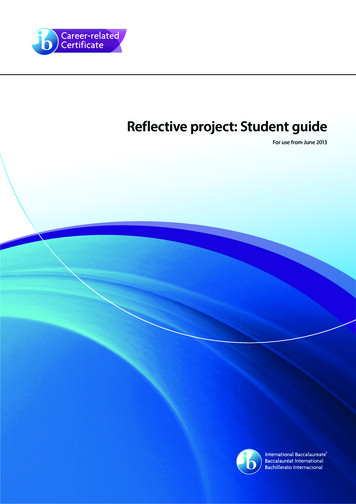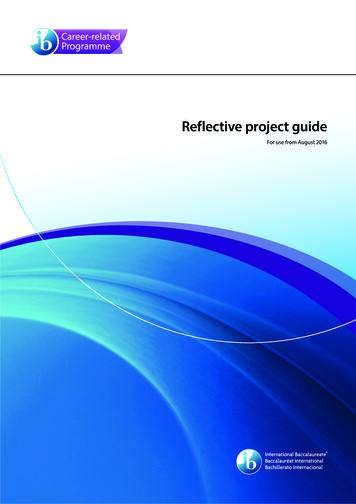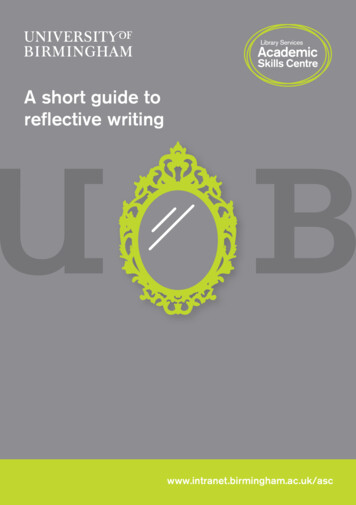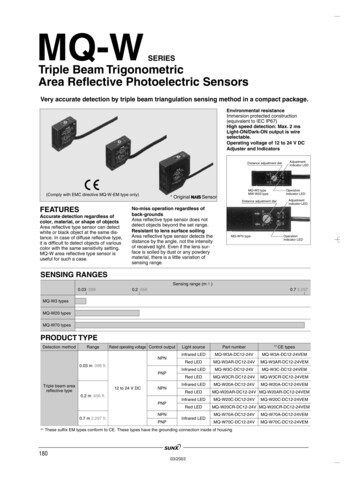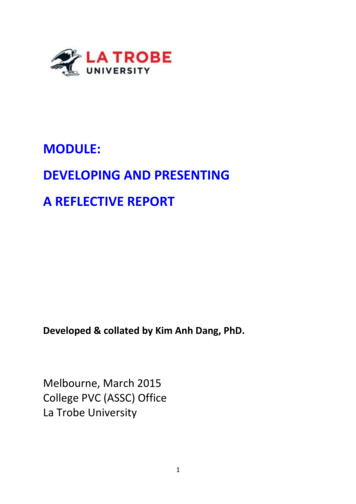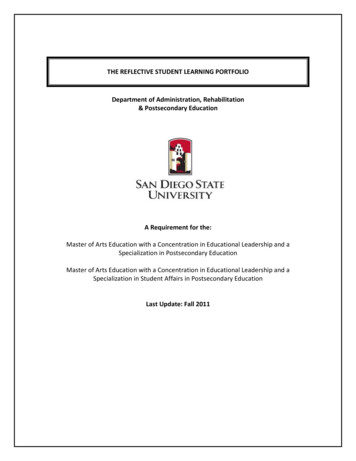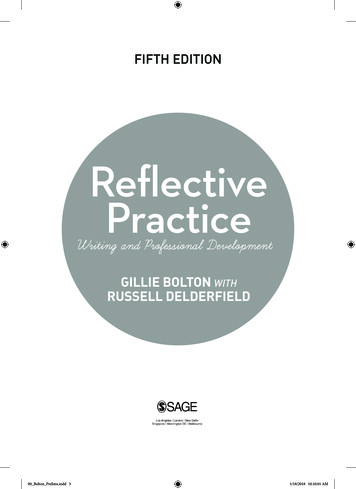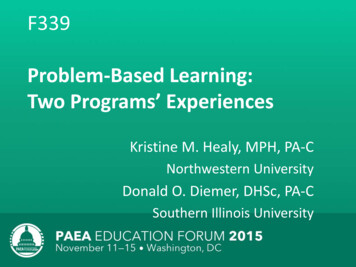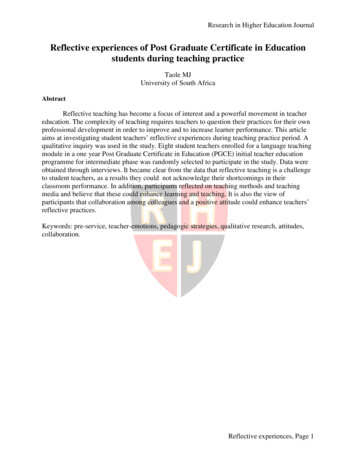
Transcription
Research in Higher Education JournalReflective experiences of Post Graduate Certificate in Educationstudents during teaching practiceTaole MJUniversity of South AfricaAbstractReflective teaching has become a focus of interest and a powerful movement in teachereducation. The complexity of teaching requires teachers to question their practices for their ownprofessional development in order to improve and to increase learner performance. This articleaims at investigating student teachers’ reflective experiences during teaching practice period. Aqualitative inquiry was used in the study. Eight student teachers enrolled for a language teachingmodule in a one year Post Graduate Certificate in Education (PGCE) initial teacher educationprogramme for intermediate phase was randomly selected to participate in the study. Data wereobtained through interviews. It became clear from the data that reflective teaching is a challengeto student teachers, as a results they could not acknowledge their shortcomings in theirclassroom performance. In addition, participants reflected on teaching methods and teachingmedia and believe that these could enhance learning and teaching. It is also the view ofparticipants that collaboration among colleagues and a positive attitude could enhance teachers’reflective practices.Keywords: pre-service, teacher-emotions, pedagogic strategies, qualitative research, attitudes,collaboration.Reflective experiences, Page 1
Research in Higher Education JournalIntroduction and backgroundReflective teaching is a significant element in student teachers’ initial trainingprogramme. It has also been widely acknowledged by many researchers as an approach thatcould promote teachers’ professional development and improves the quality of teaching andlearning. Jacobs, Vakalisa and Gawe (2011:60) contend that reflective teaching offers teachersthe opportunity to renew their practice and to understand the effects of their teaching. Theyfurther state that reflective teaching provides information on how teachers connect with learnersmeaningfully thus promoting sound teaching and learning practice.Killen (2007:100) states that:Reflection helps teachers to appreciate that they too can be producers of educationalknowledge because through their careful consideration of their learning and teaching experiencesthey can develop insight that will help them and their colleagues to better understand teachingand learning.The above quote suggests that through reflective practice teachers can contribute to the body ofknowledge regarding teaching and learning. It also stresses collaboration among colleagues sothat they can assist one another to improve their practice. In addition, reflective teaching enablesteachers to take charge of their own development.Akbari (2007:192) suggests that reflective teaching will make teachers question clichésthat they have learned during their formative years and will also enable them to develop moreinformed practice. Teachers will integrate the knowledge they have gained during pre-servicetraining with their practical experiences and make informed choices based on the situations theyfind themselves in. As Braun and Crumpler (2004:61) suggest, those who do not reflect upontheir practices will be likely to teach as they were taught and thus ineffective teaching strategieswill be replicated. Therefore, reflective teaching assist teachers in refining their beliefs andtheories about teaching as they will relate what they knew and learned to their practicalexperiences. Killen (2007:98) maintains that unless teachers understand what they are doing andwhy they are doing it, there is little chance that their efforts will result in student learning or thattheir actions will be morally and ethically appropriate. This suggests that reflection will improvepractice if teachers learn from it.Reflective teaching has been defined and interpreted in numerous ways, from a variety ofpoint of view, by various researchers and groups. This paper will adopt the following definitionof reflective teaching as Jacobs et al (2011:56) advocate: “reflective teaching is a continuouscycle of systematic self- evaluation by a teacher of his/her own teaching through open discussionwith colleagues or written analysis”. This suggests that reflective teaching is a deliberate,planned and a collaborative effort. Teachers are expected to work together and not in silos foreffective teaching and learning.The South African Department of Education (DoE) has embarked on the intensivetraining of teachers since the dawn of democracy in 1994. According to the DoE (2011:20)quality education is still an elusive concept in the country as teachers still lack the professionalqualities that would enable them to function effectively in the classroom. This article argues thatteachers as agents of change need to reflect on their teaching practices so as to learn from theirprevious experiences. Teachers need to question their practices and be open to differentpossibilities in their teaching experiences. It should be noted that teachers can question theirpractices if they know how. Yang (2009:11) indicates that critical reflection does not comenaturally to most teachers, therefore appropriate opportunities for reflection should be providedReflective experiences, Page 2
Research in Higher Education Journalto student-teachers. This suggests that reflectivity is a skill that needs to be acquired by learningand not by automatic occurrence.Research has been conducted on reflective teaching as an essential part in teachers’professional development, (Griffiths 2000; Killen 2007; Akbari 2007; Conley, De Beer, DunbarKriege, Du Plessis, Gravett, Lomofsky, Merckel, November, Peterson, Robinson & Van derMerwe 2010; Jacobs 2011). Little has been done to investigate student teachers’ reflectiveexperiences during teaching practice. Griffiths (2000:545) argues that reflection is taken forgranted rather than being made explicit. There is an assumption that student teachers willautomatically reflect on their practices. This article is a contribution on the discourse onreflective practice in an initial teacher education programme. It also aims at suggesting strategiesthat could assist student teachers to become reflective teachers.A qualitative enquiry was used for the research and data were collected throughinterviews. The participants were students from the University of South Africa (Unisa). Theseparticipants enrolled for a language teaching module in a one-year Post Graduate Certificate inEducation (PGCE), which is an initial teacher education programme for intermediate phase.This study is structured as follows: the first part gives the introduction and conceptualisation ofreflective teaching. This is followed by the theoretical framework, research question, researchdesign and methods, findings and discussions. Lastly, the conclusions and recommendations willbe presented at the end of the study.Theoretical frameworksThe changing demand and responsibilities placed on teachers requires them to bereflective in order to respond appropriately to their changing circumstances (Killen 2007:98).The importance of reflective teaching in South African context is encompassed by the Normsand Standards for Educators (Department of Education 2000). The Norms and Standards forEducators’ policy acknowledge that teachers need to take charge of their personal andprofessional development. In addition, the Norms and Standards for Educators require teachersto have ‘reflective competence’. Killen (2007:99) defines reflective competence as the ability tointegrate performance with decision-making and understanding, and adapting to changeunforeseen circumstances. Furthermore, Killen (2007) adds that this would not be possible ifteachers have not mastered the ability to reflect on their practices. Teachers need to constantlymake decisions and adapt their teaching to suite the diverse needs of learners in their classrooms.Reflective thinking involves the notion that learning and teaching requires use of multiplestrategies to accomplish a particular goal. Therefore, there is need for teachers to acknowledgethat the method or strategy that they use in the classroom represents one of the differentstrategies available to assist them to accomplish their teaching-learning goals. Killen (2007:94)contend that any approach to teaching or reflection that does not acknowledge that otherapproaches have some merit is dangerous. It should be mentioned that no approach is an end buta means to achieve learning outcomes.Schön (1983; 1987) identified two approaches to reflective practice, namely reflectionon-action and reflection-in-action. Reflection on-action can be defined as the self-evaluativethinking that teachers engage in after most lessons. Killen (2007:96) regards reflection on- actionas a deliberate attempt by the teacher to understand past events in order to shape future actions.According to Conley et al (2010:5) reflection-in-action-refers to reflection while one is engagedin practice. They refer to this reflection as ‘self-talk’ because the teacher is silently andReflective experiences, Page 3
Research in Higher Education Journalcontinuously engaged in reflective process while teaching. This means that teachers questionwhat they are doing, why they are doing it and the impacts on their learners. Killen (2007:96)maintains that for teachers to reflect in practice they must be able to frame problems almostsubconsciously, generate hypotheses and immediately test them. Killen (2007:96) reiterates thatboth approaches to reflection involve framing and reframing problematic situations and thedifference is that they occur at different times.Jacobs et al (2011:59) reiterate that reflective teaching is a process that begins withteaching, choosing one aspect of the lesson that you want to investigate, describe that part indetail, ask yourself why the chosen event happened, reframe events in the light of severaltheoretical framework, ask yourself what you could have done differently, plan what needs to bedone in the next light of analysis and start all over again. The reflective processes as advocatedby Jacobs et al (2011:59) are presented in figure 1 below:Figure 1: Reflective cycleAdapted from Jacobs et al (2011:59)Research questionThe aim of this study was to investigate student teachers reflective experiences duringteaching practice. The study will be guided by the following research question: What are thestudent teachers reflective experiences during teaching practice?Research methodologyThe study adopted a qualitative research approach to facilitate entry into the participants’life-world and to explore their life-experiences or understanding the phenomena from theparticipants’ perspective. As Yates (2004:157) points out, qualitative research is concerned withReflective experiences, Page 4
Research in Higher Education Journalthe perspectives of the participants. This involves how participants understand the social worldand what meaning it has for those that are under study.SamplingTwenty students were allocated to me to supervise during the teaching practice session ofFebruary to December 2011. Eight student teachers from the University of South Africa (Unisa)enrolled for a language teaching module in a one-year Post Graduate Certificate in Education(PGCE). This PGCE is an initial teacher education programme for intermediate phase wherestudent teachers were randomly selected to participate in the study. Random sampling methodwas used in this research to ensure that all the respondents stood the chance of being selected toparticipate in the study (Mertens 1998:314). This method was also used for convenience as theresearcher was visiting students doing their teaching practice at that time. In addition, randomsampling allows the researcher to generalise the results beyond the immediate group studied.Student teachers were expected to do ten weeks teaching practice in the schools of their choice.The participants were expected to reflect on their teaching experiences during their teachingpractice period. These participants were asked questions such as:1. What is your impression about the lesson?2. What would you do differently if you were to teach the same lesson all over again?Data collection instrumentsSemi-structured interviews were used in order to gain a detailed picture of participants’experiences of reflective practice during their teaching practice. Reflective teaching involvesteaching and providing answers of why certain events happened through the use the theoreticalframeworks to back up the decisions that had be taken. Semi-structured interviews allow moreflexibility and the researcher is able to make a follow up to particular interesting avenues that canemerge in the interview (De Vos, Strydom, Fouché and Delport 2011:351). Because the primarydata of qualitative interview are verbatim accounts of what transpires in the interview sessions atape recorder was used to record the interviews. Permission was obtained from the participants torecord the interviews on a tape recorder. Neuman (2006:450), states that recording ensurescompleteness of the verbal interactions and provide material for reliability checks. Studentteachers had to present a lesson and were interviewed after that.Data AnalysisAfter data was collected, it was analysed and interpreted. Qualitative analysis processused in this article involved data reduction, data display and conclusion drawing (Miles andHuberman 1984:10). Data reduction refers to the process of selecting, focusing, simplifying,abstracting and transforming the data that appear in written-up field notes or transcriptions, Milesand Huberman (1994:10). This occurs continuously throughout the life of the research project.Data display involves organising information to facilitate drawing of conclusions.Reflective experiences, Page 5
Research in Higher Education JournalEthical considera
Reflective experiences of Post Graduate Certificate in Education students during teaching practice Taole MJ University of South Africa Abstract Reflective teaching has become a focus of interest and a powerful movement in teacher education. The complexity of teaching requires teachers to question their practices for their own professional development in order to improve and to increase learner .
